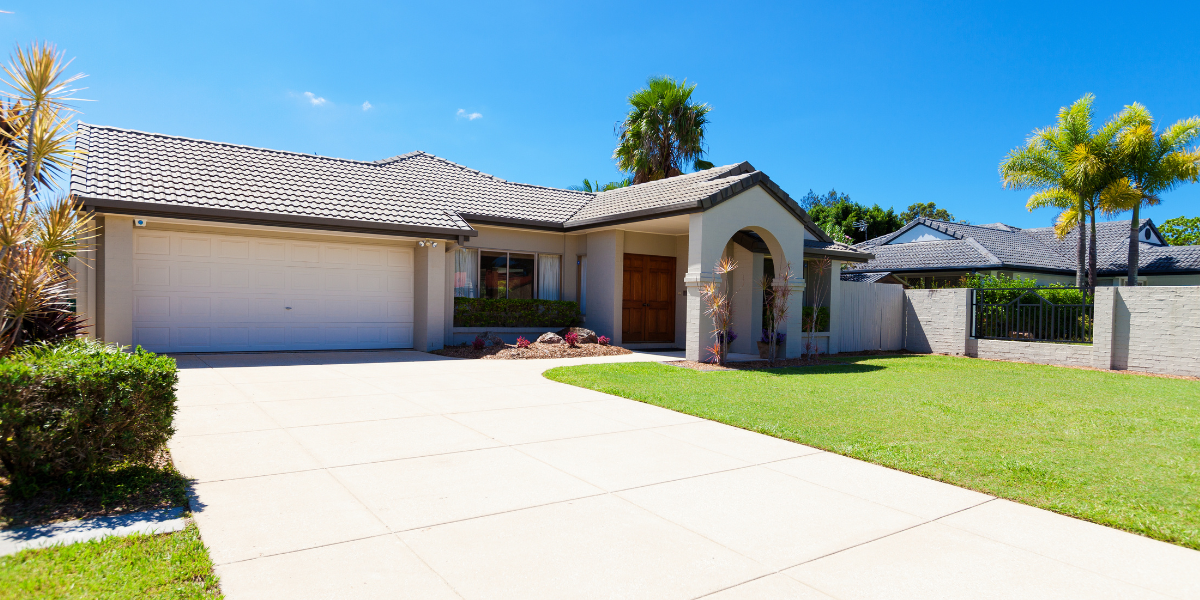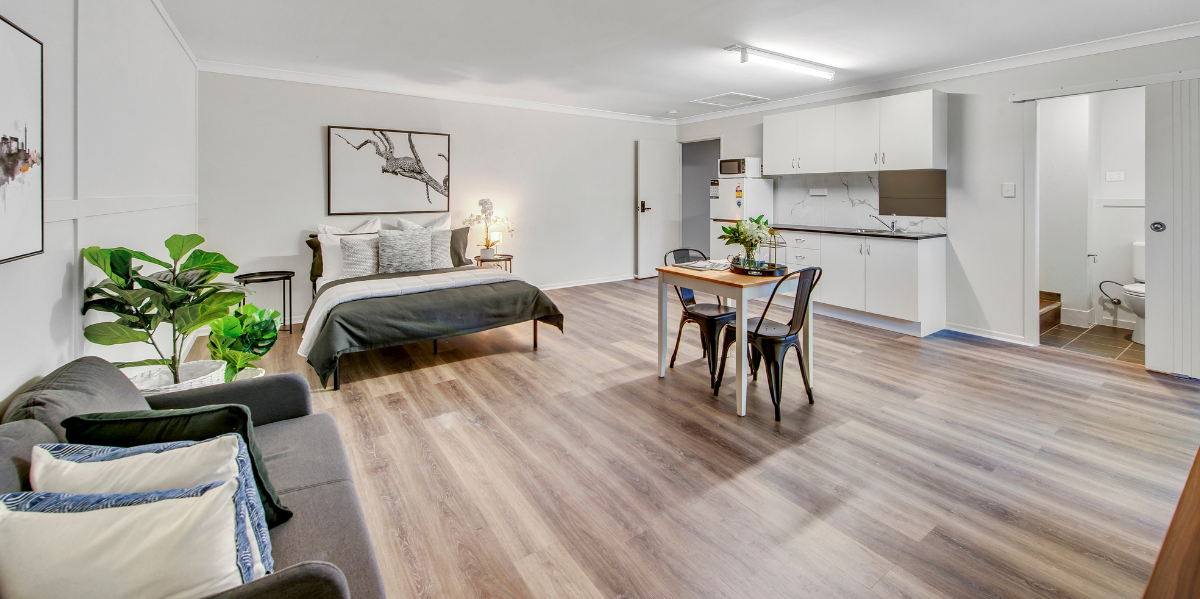There is no bible on how to be a property investor. In 30 years I’ve made plenty of property investing blunders, and I’ve always been open about that.
The best thing you can do is analyse your mistakes and learn from them – so here’s your opportunity to learn from 7 of mine!
Mistake 1: Being driven by emotion, not strategy
When the economy is in a state of flux and property prices are rising or falling (sometimes simultaneously!) – that’s when emotions run high.
All the industry experts are publishing their forecasts and everyone’s quoting them with dollar signs in their eyes. It’s also when the armchair experts come out.
The end result is people start to panic. They jump in and do rash things. It’s these FOMO-driven property decisions – and a lack of strategy, that’s hurting people financially.

It’s like starting a skydiving business.
This is how I described it to Adrian Franklin in my Ticker HOME episode, ‘7 Property mistakes to avoid’.
Someone gifts you a Red Balloon skydive. You jump out of the plane, you feel the rush, you think it’s amazing. So you decide you’re going to start a business based on that emotional high.
You haven’t got a plan, you haven’t even got a licence. You actually don’t know if there’s a business model in it. And even if you do get the business off the ground – pardon the pun – it’s probably going to fall on its face.
Property’s the same. If you chase an idea that’s not backed by strategy, you’re going to get yourself in a lot of trouble.
What I suggest is that instead of reacting to what you’re hearing, sit back, take a deep breath and strat-e-gise.
Go find the real experts – people who’ve invested in property multiple times over many years – and read everything they’ve written. Be clear about why you’re buying a property and the outcome you want.


Mistake 2: Falling for the negative gearing hype
As you’ll know from reading previous blogs, I do not support negative gearing as a strategy.
Owning a rental property where the costs outweigh the income? Offsetting your loss against other income? I don’t buy it.
What you end up doing is pulling money out of your own pocket every week, every month, every year to make up for the shortfall. My wife and I negatively geared our propertis for years with a less-than-positive result.
I’m positively geared all the way these days. Learning how to be a property investor is about viewing your property investing as a business, with profit your ultimate goal.
If you are looking for tax kickbacks, do your homework and find out how to best manage depreciation and scrapping schedules, capital gains tax, goods and services tax and beneficiary distributions.


Mistake 3: Succumbing to the marketing sizzle
Every week it seems, there’s a big developer fan-faring a new house-and-land package opportunity.
Spruiking the properties on their behalf are these specialist real estate agents. Their mission is to make a property seem irresistible. When these agents are making 10% commission on each sale, the last thing on their mind is your financial future.
So how do you identify the house that will meet your needs versus the sales pitch? Start by educating yourself about the sales process. Do your own research, don’t use their research.
Be aware that the capital growth on house-and-land packages is likely to be limited if you’re buying close to farm land/future development.
That’s where I come back to manufactured growth – can you add value to the package?
Don’t succumb to the sizzle, or the steak for that matter. If you ask me how to be a property investor, it’s when you start building the barbecue yourself.


Mistake 4: Sticking with the same bank for all your loans
When you’ve got an established relationship with a lender for existing property/s, it feels logical to go back to that bank for your next property.
You’re used to dealing with their systems and their apps. And it’s reassuring – they’ve given you money once, they probably will again. There might be a financial incentive, say a .2% reduction in interest rate, to sweeten the deal.
But there are risks with this kind of cross securitisation, when they link your separate loans together in an “all monies” clause – the main one being you have no control.
If your mortgage and savings accounts are with the same bank, they have your data. They’re watching your income coming in, they’re watching your spending habits. Let’s say you’ve just had a baby – they know your income has been reduced.
They can actually start to dictate what you can and can’t do on your investing journey, including what you do with your assets. That may limit your ability to manufacture growth.
These days, I have my personal savings accounts and mortgages with different banks. I would rather go to different lenders and pay more interest to get a better outcome for my family.


Mistake 5: Buying investment property in your own name
It makes sense to purchase your principal place of residence – the home that you live in, in your own name. There’s a 100% capital gains tax exemption on that. But when you purchase a property as an investment, it should be in a structure.
Why? A little-known fact is that Australia has been rated the second most litigious country in the world. I use the alarming example of Mark Shanahan, who played a round of charity golf and accidentally hit another player. That player suffered brain damage and needs care for the rest of his life.
After 10 years of litigation, the court ordered Shanahan (who was uninsured) to pay $2.6M in damages. He filed for bankruptcy and lost all of his assets.
If he had been protected, buying all of his property in an asset protection structure, he’d still be dealing with the repercussions of that horrific event. But he would have the security of his assets behind him.
Just make sure that you engage qualified financial advisors to guide you on asset protection.
Learn the ins and outs of Asset Protection in my Fundamentals Of Property Program HERE.


Mistake 6: Becoming a property trader, instead of an investor
How to be a property investor? Some people think it’s about acting like a share trader.
Watching all those property flipping shows, hearing tales of friends of friends who’ve sold for a massive profit – people think they can buy and sell and buy and sell, for apparently easy gains.
But in reality, the property that does double in price, (and not all does) will usually take 7 to 10 years. And every time you purchase, you’re up for stamp duty, pest and building inspections, legal fees and more. On each sale, there’s agent commission, legal fees etc.
Increasing your wealth comes from holding on to your properties for as long as you can, to ensure you have positive gearing and cash flow.
Mistake 7: Investing without getting educated first
I am my own cautionary tale.
As a younger man, I thought I knew it all. I owned seven properties, I was cross securitised, I’d bought them in my own name, I’d negatively geared them to the tune of $36,000…
Which translated to $692 coming out of my pocket every Monday morning, before I even got out of bed. The bank had me locked in, they knew it, and they were tightening the screws.
Selling down was the only way I could get myself out of trouble. I lost 50% of my wealth in the process. Those seven properties almost pushed me under.
That’s when I set out to get educated. My goal was to leave full time employment and 13 months to the day later, I’d met that goal. I earned enough money that I didn’t need to work for someone else.
And that’s what I want to teach you to do. That’s how to be a property investor in my book.
GET STARTED: Find out about how your can reach your investment goals with through co-living investments with my free Positive Cash Flow Live webinar HERE.




